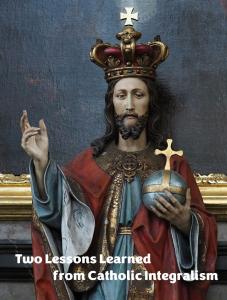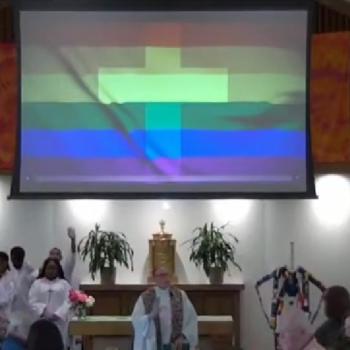I recently came across a new concept—well, new to me, in a 2022 article for the National Catholic Reporter about then senate contender JD Vance. The concept: Christian/Catholic integralism. This then lead me to another article about a “conservative” conference at Steubenville that further explained this concept, although in an aggressively negative and uncharitable way.
Christopher van der Krogt offers a scholarly definition of Catholic Integralism. In his article, Catholic Fundamentalism or Catholic Integralism, he states:
Integralism derives its name not only from the concern to preserve the integrity of Catholic tradition but, more particularly, from its conviction that Catholicism provides the only satisfactory basis for the ordering of society. Religion, it is argued, is not a merely a private concern, for it determines the ethical values for all social conduct and the state has a duty to defend the interests of the Church.
And
Waldemar Molinski defines “integralism” as the belief that “the world is to take shape only under the direct or indirect action of the Church.”
In other words, Catholic integralists take seriously the claims of their faith and their faith’s relation to civic engagement. To integralists, since Catholicism is true, only the Catholic Church fully understands anthropology and, therefore, all human institutions should fall under Church authority, both spiritual and temporal. While not an integralist, I think all Catholics can learn something from this political philosophy.
In this article, I reflect on two specific lesson all Catholics should learn from Catholic integralism.
The Goal of All Human Life is Beatitude
In the book Integralism: A Manual of Political Philosophy, authors Fr. Thomas Crean and Alan Fimister make the following claim regarding the ultimate goal of human existence, divine revelation’s role in achieving this goal, and the Catholic Church’s role within divine revelation:
Hence only the Catholic Church is properly speaking and intrinsically a perfect society. For her end is beatitude: the vision of God in union with Christ and the saints. When attained, this brings complete fulfilment and a happiness experienced as wholly satisfying: first for the soul alone, and then, after the resurrection, for the whole man.
Beatitudes reflect the true end to which humans can achieve complete fulfillment and happiness. Jesus lists the Beatitudes in Matthew 5:3-12.
The Catechism of the Catholic Church, paragraph 1719, confirms this Catholic truth. It states:
The Beatitudes reveal the goal of human existence, the ultimate end of human acts: God calls us to his own beatitude. This vocation is addressed to each individual personally, but also to the Church as a whole, the new people made up of those who have accepted the promise and live from it in faith.
And in paragraph 1721, the practical aspect of Beatitude is explained:
God put us in the world to know, to love, and to serve him, and so to come to paradise. Beatitude makes us “partakers of the divine nature” and of eternal life. With beatitude, man enters into the glory of Christ and into the joy of the Trinitarian life.
Lesson 1
As stated at the beginning of this article, Catholic integralists affirm Catholic anthropology as THE anthropology. Therefore, they take very seriously the Church’s teaching on how to live the best possible human life. God created humans and knew how best to satisfy their needs and desires. God also revealed the best way to achieve human fulfillment through Jesus Christ, and Jesus sent the Holy Spirit and established a Church to guide humankind towards attaining “the joy of the Trinitarian life.”
Moreover, if all Catholics took the Church’s teaching as seriously as Catholic integralists, that is, truly believed Catholic anthropology as THE anthropology, how different our world would look today. While not going as far as believing only Catholics need govern society, Catholics must use their political voices ways that aligns with their religious beliefs, as if they actually believe it to be truth. To identify as Catholic, yet express oneself contrary to Catholic belief, demonstrates that one does not actually believe Church teaching in the first place.
Supernatural Ends Transcends the Good of Natural Society
Fr. Crean and Fimister go on to state that, as an eternal creature, humans were made for heaven, not for mere human society.
Finally, this papal aphorism indicates that man has a supernatural end, which infinitely transcends the good of any natural society. Not even the most outstanding such society could have the right to preserve itself at the cost of the faith, hope or charity of a single citizen…
Moreover, each saint loves the good of the heavenly city more than his own good, and if per impossibile there could be occasion for him to renounce the latter for the sake of the former, he would not hesitate to do so. Man is for the heavenly city.
All earthly common good subordinates to heavenly ones. Again, Catholicism taken at face value means the goal for all human lives is heaven. Therefore, we must determine if any perceived “good” leads to eternal life or death. This, according to integralists, is known only through divine revelation.
Hence, the end to which the temporal ruler directs the multitude can only be correctly pursued when it is subordinated to the higher goal which is eternal life. Most especially does this apply to the highest naturally knowable good, that of religion, and the fulfilment of our most fundamental naturally knowable duty, namely to worship our Creator according to the manner that He has appointed: for without submitting to an authority based on revelation, the temporal power cannot know in what this good and this duty concretely consist and order its actions accordingly.
Lesson 2
In Matthew 16:26, Jesus posed a question about the cost of a human soul. He asks:
For what will it profit a man if he gains the whole world and forfeits his soul? Or what shall a man give in return for his soul?
In other words, all the material goods in the world do not equate to the worth of one human soul, even morally good goods. Some Catholics, on the more liberal side, tend to point to the common good in their continued support of politicians (even Catholic politicians) who support abortion rights and gender theories that contradict Catholic anthropology. They claim that “at least these politicians support social programs that help the majority of people and therefore contribute most to the “common good.” My question to them is: what does it profit a society to gain expansive social programs at the expense of its soul? How many aborted babies will our society sacrifice for greater access to SNAP?
Now, if these same politicians (the Catholic ones) acted in accordance with their faith and not in opposition to it, they could both support the unborn and social programs—a consistently Catholic position. Then Catholic voters could, in good conscience, vote to protect the unborn and provide greater access to SNAP and other social programs. All Catholics can learn from Catholic integralists that no “common good” should trump the ultimate good of the heavenly good.
Take the Faith Seriously
In conclusion, Catholic integralism offers some serious food for thought to all thoughtful Catholics. Catholic integralists, in an extreme way, reflect a logical outcome of taking Catholic teaching seriously. If God exists and if Jesus Christ, the second Person of the Divine Trinity, established the Church, thereby setting up the means by which humans find their ultimate meaning and fulfillment, then such truth has real world consequences. Moreover, if Catholicism is true, it is true regardless of who does or does not believe it. If it is true, Catholicism provides the only way to experience “complete fulfillment and a happiness experienced as wholly satisfying.” This satisfaction is not limited to just the afterlife, but the life here and now. If true, and we believe it as such, this truth must influence how we engage private and public life. In other words, how we express our political and social wills.
All Catholics must ask themselves how seriously they take the tenants of their faith. Catholic integralists certainly do.
Thank you!
If you enjoy my writing and want to support my work, please consider donating $1 or any size gift by clicking here. Thank you!
Read my other writing here.
Please click the link below to join.
Voices of the Faithful in the Synod on Synodality
Please make your voice heard.
I Support Church Teaching in the Synod of Synodality













